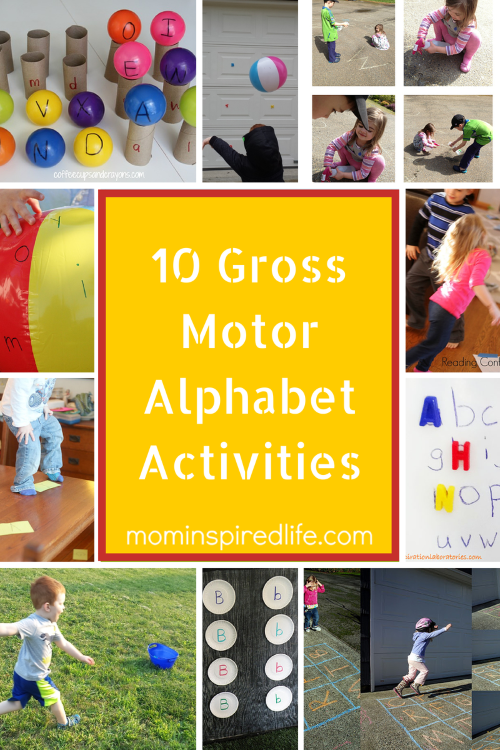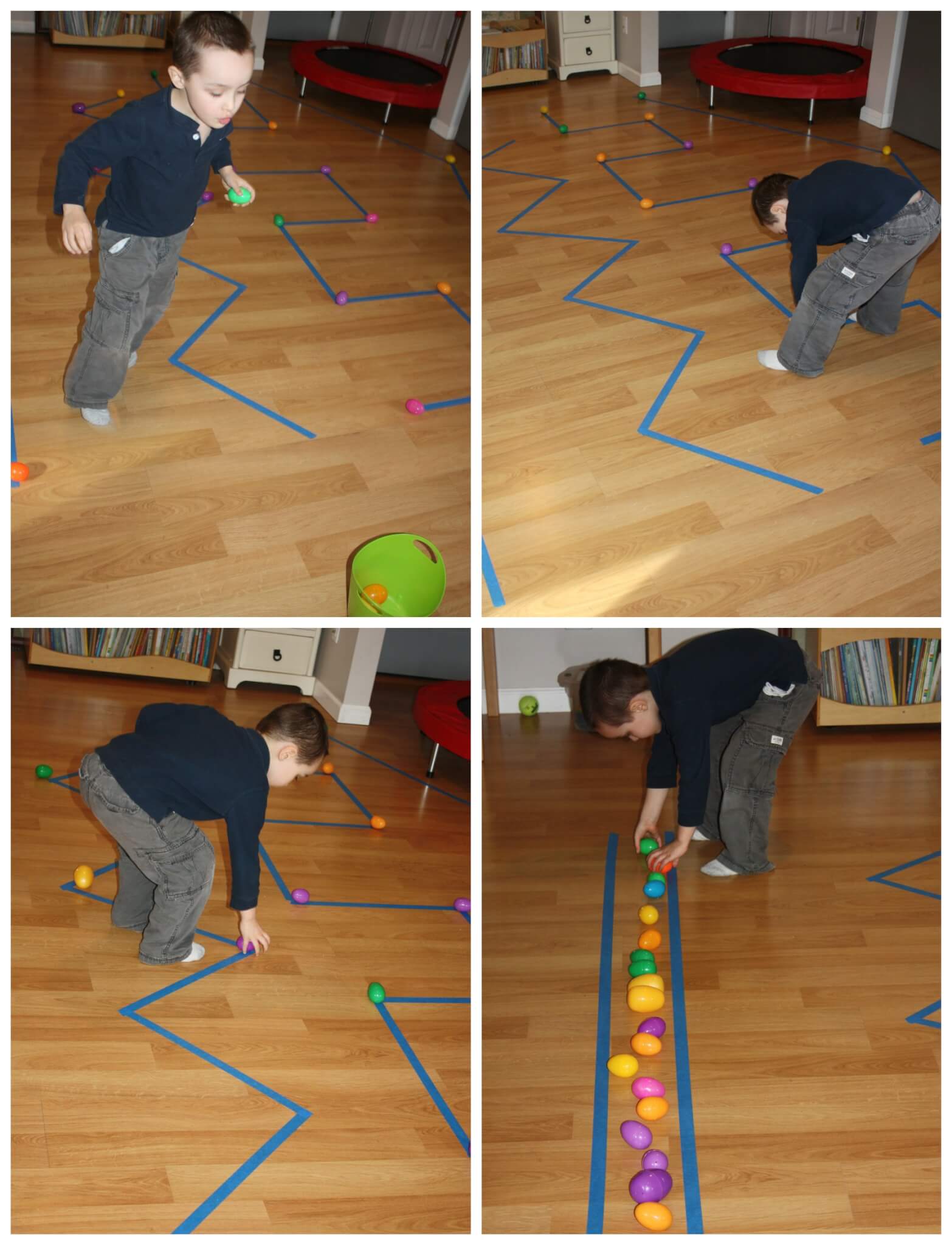65 Gross Motor Activities for Toddlers & Preschoolers 1,2 & 3 years old

Gross Motor Activities for Preschoolers The Top 35!
4) Trampolines are great for strengthening your child's gross motor skills. 5) Encourage your child to ride their tricycle or bike whenever possible. As they grow older, you can place obstacles on their path for them to navigate. 6) Let your child practice throwing using wooden skittles. 7) Organize an obstacle race.

Skate around the classroom on paper plates. A great Gross Motor activity for when it's too wet
1 - Toss bean bags into baskets Provide laundry baskets. Then get your learners in several rows, and have them take turns tossing bean bags into the target. 2 - Move on paper plates Buy some colored paper plates. Then get creative! Place them in a row (red, green, red, green) and have students step on just the red ones.

10 Gross Motor Alphabet Activities for Preschoolers
#1 - Physical Fitness Gross motor skills activities help improve cardiovascular fitness, muscle strength, and endurance, promoting overall physical health and well-being. #2 - Coordination and Balance These activities require children to coordinate their movements, improving their balance, spatial awareness, and hand-eye coordination.

Gross Motor Activities for Indoor Sensory Play
Things like running, walking, jumping, climbing. All normal things kids do. But also crawling, swinging a bat, balancing, and sometimes even stretching. Play any kind of sport or do any kind of exercise like jumping rope or jumping jacks. When Should Kids Work on Developing Gross Motor Skills?

Gross Motor Beach Ball Game PreK Pages Beach theme preschool, Gross motor, Gross motor
Gross motor activities. I've always been a huge fan of ways to get the kids to move! Working on big movements and major large muscles with gross motor specific activities is the perfect way to really move and learn. Gross motor activities are some of my favorites because: It really wears them out! Number one reason by far!

Fun Gross Motor Activity TIC TAC TOSS
There are other ways to build gross motor skills in toddlers and preschoolers besides climbing on the jungle gym, chasing bubbles, or rolling around. Gross motor skills are large muscle movements that relate to body awareness, balance, hand-eye coordination, speed, agility, strength, and more.

Indoor Gross Motor Activities For Preschoolers Preschool activities toddler, Preschool
A gross large motor activity is any stand alone or combination of simple activities that challenges or uses the gross motor system and works on the strength and coordination of these muscles. Outdoor gross activities, indoor gross motor activities, free play, and even DIY gross motor activities can all help work on these areas.

Create A Outdoor Gross Motor Activities For Preschoolers You Can Be Proud Of anniedialogue
Outdoor Gross Motor Activities Gross Motor Skills Games Fine Motor Skills Little kids can develop their gross motor skills through a variety of fun activities. Active play that uses the large muscles of the legs, arms, and trunk is important for your preschooler's health and physical development.

Name Hop Gross Motor Name Activity Fantastic Fun & Learning Name activities preschool, Gross
Download the FREE Active Indoor Week of Activities Preschooler have more gross motor control than toddlers Granted, preschoolers have much more control than a toddler does (due to improvements in their fine motor skills ), and their academic level has jumped by leaps and bounds in only a year or so.

Pin on Indoor Learning and Play
We need gross motor skills for everyday activities, such as getting dressed, walking to work, and school, and sitting at a desk (4). Toddlers and preschoolers need well-developed gross motor skills so they can learn how to: Dress and undress. Use the potty. Navigate the world around them without bumping into things.

Simply Awesome Gross Motor Activity for Preschoolers! Gross motor activity, Motor activities
This involves lifting, pushing, raising and lowering limbs, and moving through spaces. Games, music, and role play promote body movement and spatial awareness using those large motor, or gross motor, muscles. Here's the incentive This digital product contains fun and easy activities you and the kids can jump right into.

Gross Motor Days With Grey
20 gross motor activities for kids If you suspect your child has delayed gross motor skills, it's important to seek the help of a professional to identify the issues and ensure a proper plan is put into place to help develop the skills he needs to excel, but there are also tons of ways you can support your child at home.

Create A Outdoor Gross Motor Activities For Preschoolers You Can Be Proud Of anniedialogue
These gross motor skill activities include throwing, catching, kicking as well as riding a scooter or a bike. Why are gross motor skills important for toddlers and preschoolers? Developing key building blocks such as muscle strength, balance and coordination are absolutely necessary to enhance the body's planning and sequencing.

Gross Motor Activities for Indoor Sensory Play
Here are some fun outdoor gross motor activities for preschoolers: Obstacle Courses: Source: mykidstime.com Set up an obstacle course in your backyard or at a local park. Use cones, hula hoops, and other items to create a course that includes crawling, jumping, and balancing activities. Tag Games: Source: gameonfamily.com

3 Gross Motor Activities For Toddlers Who Like to Move Toddler gross motor activities, Motor
For the 2 year old preschool class, gross motor activities might include walking on a line, simple obstacle courses, rolling and kicking a ball, crawling tunnels, simple climbing structures, throwing a ball at a large target or to a teacher, and position changes such as getting down on the floor. All of these activities should be rooted in play.

Outdoor Gross Motor Ball Color Sort Stir The Wonder Motor skills activities, Kids learning
Gross motor skills refer to the ability to control large muscles in the body (such as the legs, arms and hips among others) to perform activities that are essential for physical development and daily functioning, from walking, jumping, throwing, and running to playing sports and climbing stairs.